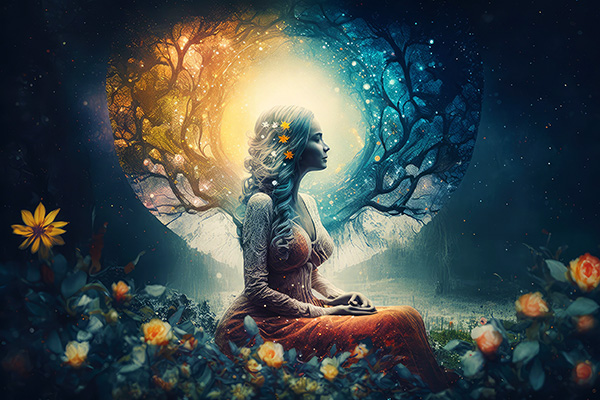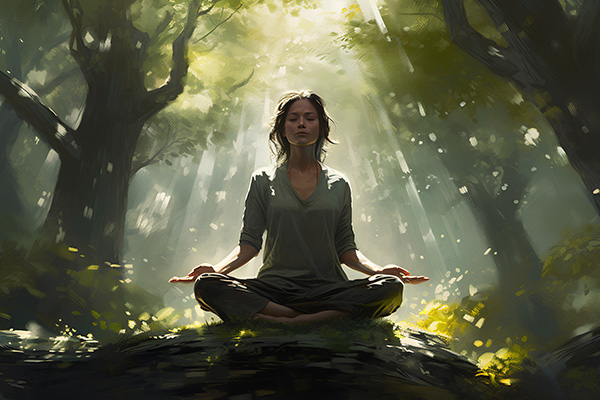spiritual routine
Spiritual Self-Care For The Sensitive Soul
 For those of us who are highly sensitive, including psychics, mediums, healers, and empaths, practicing consistent spiritual self-care is essential to maintaining our overall well-being.
For those of us who are highly sensitive, including psychics, mediums, healers, and empaths, practicing consistent spiritual self-care is essential to maintaining our overall well-being.
If you identify with this group and neglect the daily maintenance of your energetic health and spiritual hygiene, you leave yourself vulnerable. This can manifest as emotional, mental, and even physical health problems. The good news? You can safeguard your well-being with a dedicated spiritual self-care routine.
Spiritual self-care is about nurturing your inner being and maintaining healthy energy flow and balance. It includes practices that support your spiritual well-being and ensure that you stay grounded, centered, and connected to your higher self and the universe.
Regular spiritual self-care is also a matter of health. Research strongly supports the positive effects of spirituality on our overall health. Studies show that spiritually active people tend to live longer and enjoy better mental and physical health. For example, spirituality has been shown to correlate with a reduced risk of Alzheimer’s disease and cognitive decline.
Spirituality is associated with better mental health, including lower levels of depression and anxiety. Studies show that spiritual activities promote positive emotions such as hope, forgiveness, and gratitude, which contribute to resilience to stress and emotional challenges. It also promotes healthier lifestyles, including reduced substance use and better stress management.
Cultivating A Thriving Garden Of The Mind
 Your mind is like a fertile garden, constantly nurturing and cultivating the seeds of thought you plant each day. Every waking moment your ideas, beliefs, and perceptions take hold and gradually grow into the mental landscape that ultimately shapes your reality.
Your mind is like a fertile garden, constantly nurturing and cultivating the seeds of thought you plant each day. Every waking moment your ideas, beliefs, and perceptions take hold and gradually grow into the mental landscape that ultimately shapes your reality.
If you could take a walk through your “mind garden,” what would you find? Would you see sturdy, thriving trees of faith, hope, and positivity, their roots deeply nourishing the soil of your thoughts? Perhaps vibrant, radiant flowers of joy, abundance and well-being brightening the landscape?
Or would you find brittle branches of lost dreams and dry, withered remnants of unfulfilled hopes? Perhaps the creeping weeds of negativity and doubt smothering your true potential, casting shadows over your hopes and ideals?
I actually do this visualization sometimes as part of my morning meditation practice. I imagine walking through my inner garden, tending to my thoughts and beliefs, nurturing them with faith and positivity, fertilizing those that are flourishing, and pulling out the weeds of doubt, fear, or negativity that had somehow taken root and are no longer serving my highest good.
I also ask for divine guidance, calling on God, my guides and loved ones in spirit to help me recognize innate talents and growth opportunities that I might have overlooked or neglected. Perhaps there are hidden seeds within me that still need to be planted or nurtured. With intention, I also visualize planting new seeds of goodness, self-empowerment, and spiritual expansion.
Reconnecting With Your Inner Light
 These days, it’s easy to feel lost, anxious, or just plain drained. We juggle the pressure to succeed, increasing isolation, endless app notifications, and even a creeping sense of loneliness or hopelessness.
These days, it’s easy to feel lost, anxious, or just plain drained. We juggle the pressure to succeed, increasing isolation, endless app notifications, and even a creeping sense of loneliness or hopelessness.
It’s no wonder so many of us feel overwhelmed and disconnected from our true selves and the deeper source of wisdom within that illuminates our lives. Instead of feeling alive and vibrant, for many people it’s just a matter of getting through the day.
But here’s the good news: There is a way out of this gray fog, and it doesn’t involve a fancy retreat or running away to join the circus.
It’s about reconnecting with the light within you-the spark of divinity that’s always been there. Once you tap into that, everything changes. You begin to feel grounded, peaceful and purposeful. Life becomes richer, more joyful, and you’ll find yourself smiling a lot more!
The spiritual concept of “light” is central to many Eastern wisdom traditions. In Hinduism, for example, “light” symbolizes divine knowledge, truth, and the divine self (atman). The famous Sanskrit phrase “tamaso mā jyotir gamaya” (lead me from darkness to light) from the Brihadaranyaka Upanishad refers to our innate desire for enlightenment and spiritual knowledge.
The concept of enlightenment (bodhi), metaphorically symbolized by light, is also central to Buddhism. In achieving enlightenment, one is said to attain wisdom and freedom from the darkness of ignorance.
A Step-By-Step Guide To Shielding Your Energy
 It is important to be aware of the invisible metaphysical forces that surround us, for not all of them are for our highest good. The energy deficiencies and dysfunctions of others, while often subtle, can have a profoundly harmful effect on our personal and spiritual well-being.
It is important to be aware of the invisible metaphysical forces that surround us, for not all of them are for our highest good. The energy deficiencies and dysfunctions of others, while often subtle, can have a profoundly harmful effect on our personal and spiritual well-being.
We all have to deal with people in our lives who can be particularly draining and unsettling – commonly known as ‘energy thieves’ or ‘psychic vampires’. Like psychic parasites, these people knowingly or unknowingly drain the energetic vitality of others, leaving their victims feeling drained, anxious, depressed, or even physically ill.
For those of us who are particularly sensitive to the energies of others, this can directly affect our physical, mental, emotional, and spiritual health in profound ways.
Energy shielding is therefore an essential spiritual practice for maintaining balance and protecting oneself from such negative influences. This type of energy work is essential for creating a protective auric barrier that ensures that the negative energies of others do not infiltrate your mind, body, or spirit. With the right attitude and some spiritual support, we are never defenseless against the negativity of others.
Energy theft, or vampirism, is not just a matter of superstition; it is something I have observed consistently throughout my life, both personally and professionally. In my own psychic practice, I rely on a robust energetic self-defense routine to ensure that any negative energy directed at me is deflected and rendered harmless.
Take The Heavenly Solitude Challenge!
 My clients often ask me how I manage to stay so positive and upbeat every time they call for a psychic reading. They often mention how my energy seems to lift their spirits, and this brings me immense joy! I feel blessed when I can share my gift for energetic healing.
My clients often ask me how I manage to stay so positive and upbeat every time they call for a psychic reading. They often mention how my energy seems to lift their spirits, and this brings me immense joy! I feel blessed when I can share my gift for energetic healing.
This does not mean that I am automatically or miraculously energized and balanced to be of service to others. To share some love and light, I have to be disciplined with my spiritual practice and self-care routine. One of the key ingredients in my self-nuturing routine that keeps me going is spending some time in solitude.
Solitude is to be alone by choice, without the presence or interference of others. As a spiritual practice it involves deliberately setting aside time to be alone, away from the distractions and demands of daily life, in order to connect more deeply with your higher self, spirit and the divine. It is a time of quiet reflection and introspection.
Unlike loneliness, which is often associated with negative emotions, solitude is a positive and restorative experience, embraced for spiritual growth and personal well-being. I often enjoy my solitude with a cup of tea or coffee, sometimes knitting, sewing, doing yoga, meditating or going for a walk. I cherish these moments and wish everyone could experience the peace they bring, even if only for a few hours each day.
A good time to embrace solitude and a spiritual practice is during times of transition or personal challenge, when life feels overwhelming or uncertain. Whether you’re navigating a career change, recovering from a loss, or simply feeling disconnected from your inner self, solitude can provide the clarity and peace you need to reconnect with your passion and purpose.
Being Present In Your Power
 In my field of work, one becomes acutely aware of the importance of being present in one’s power on a daily basis. Our personal vibration acts as a “passport” to profound spiritual experiences, helping us to access different levels of awareness, psychic perception and self-empowerment.
In my field of work, one becomes acutely aware of the importance of being present in one’s power on a daily basis. Our personal vibration acts as a “passport” to profound spiritual experiences, helping us to access different levels of awareness, psychic perception and self-empowerment.
Our personal vibration is essentially the energy we radiate and attract in return. It shapes our experiences and interactions with the world around us.
A higher vibration is associated with positive feelings, clarity, and a sense of connection to something greater, as well as manifesting abundance, well-being and prosperity. Conversely, a lower vibration can manifest as negativity, confusion, and a sense of disconnection, dysfunction, lack and scarcity.
Raising our vibration involves practices that promote emotional, mental, and spiritual well-being. These practices can include meditation, prayer, visualization, affirmation and other forms of energy work and spiritual self-care.
Over the years, I have explored various techniques to help me be more present in my power. While the specific method is a personal choice, any meditation or mindfulness technique can benefit our well-being and help us find peace in the midst of chaos.
After experimenting with different methods, I have settled on one particular practice that has been working very well for me lately. It is an effortless meditative approach that helps me connect with both my inner world and the realm of spirit.
